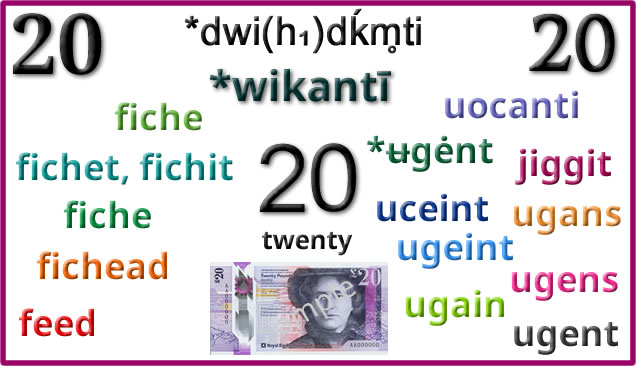Words for twenty and related things in Celtic languages:

| Proto-Celtic | *wikantī = twenty |
|---|---|
| Gaulish | uoconti = twenty |
| Old Irish (Goídelc) | fiche [ˈfʲixʲe] = twenty fichetmad = twentieth fichtige = twenty day/year period |
| Middle Irish (Gaoidhealg) | fiche, fichet, fichit, fichtea = twenty, a score fichetmad, fichatmath, fichetmudh = twentieth fichetech = pertaining to twenty fichtige = a period of twenty (days, years, etc) |
| Irish (Gaeilge) | fiche [ˈfʲɪhə/ˈfʲɪçə/fʲiː] = twenty (an) fichiú = twentieth |
| Scottish Gaelic (Gàidhlig) | fichead [fiçəd] = twenty, a score ficheadamh [fiçədəv] (20ᵐʰ) = twentieth (20ᵗʰ) fichead-shliosnach = icosahedron (a polyhedron with 20 faces) fichead-fillte = twentyfold |
| Manx (Gaelg) | feed [fiːdʒ] = twenty, a score feedoo, (yn) eedoo = (the) twentieth feed cheead = two thousand (twenty hundred) |
| Proto-Brythonic | *ʉgėnt = twenty |
| Cumbric | giggy, jiggit = twenty |
| Old Welsh | uceint = twenty |
| Middle Welsh (Kymraec) | ugein, ugeint, vgein = twenty vgeinvet, ugeinuet = twentieth ugeinwyr, vgainwyr, vgain-wr, vgain-ŵr = twenty men |
| Welsh (Cymraeg) | ugain [ˈɪɡai̯n/ˈiːɡai̯n] = twenty, score, twenty-pound note ugeinfed [ɪˈɡei̯nvɛd] (20fed) = twentieth ugeiniol = pertaining to twenty, denoting twenty ugeinw(y)r = twenty men |
| Middle Cornish (Cernewec) | ugans, hugens = twenty, a score |
| Cornish (Kernewek) | ugens, ugans = twenty ugensves = twentieth |
| Old Breton | ucent = twenty |
| Middle Breton (Brezonec) | vgent, uiguent, ugent = twenty ugentved = twentieth ugentvedenn = twentieth part ugentad = around twenty ugentvedenni, ugentvedenna = to divide by twenty ugentveder = a commemoration of 20 years ugentvederel = vigesimal (20-base numeral system) |
| Breton (Brezhoneg) | ugent [ˈyːɡẽn(t)] = twenty ugentvet = twentieth ugentvedenn = twentieth part ugentad = around twenty |
Etymology: from Proto-Indo-European *dwi(h₁)dḱm̥ti (twenty) from *wídḱm̥ti (twenty) [source].
Words from the same roots include بیست (bist – twenty) in Persian (Farsi), बीस (bīs – twenty) in Hindi and Nepali, বিশ (biś – twenty) in Bengali and વીસ (vīs – twenty) in Gujarati, and words for twenty in some other Indo-European languages languages [source].
Incidentally, the English words twenty, and words for twenty in other Germanic languages, are not cognate. Instead they come from the Proto-Germanic roots *twain- (two) and *-tigaz (group of ten) [source].
Sources: Wiktionary, Am Faclair Beag, Online Manx Dictionary, Teanglann.ie, eDIL – Electronic Dictionary of the Irish Language, In Dúil Bélrai English – Old Irish glossary, Geiriadur Prifysgol Cymru, Gerlyver Kernewek, Gerlyvyr Cernewec, Dictionaire Favereau, TermOfis, Le dictionnaire diachronique du breton, Geriafurch, English – ProtoCeltic WordList (PDF), Etymological Dictionary Of Proto Celtic







